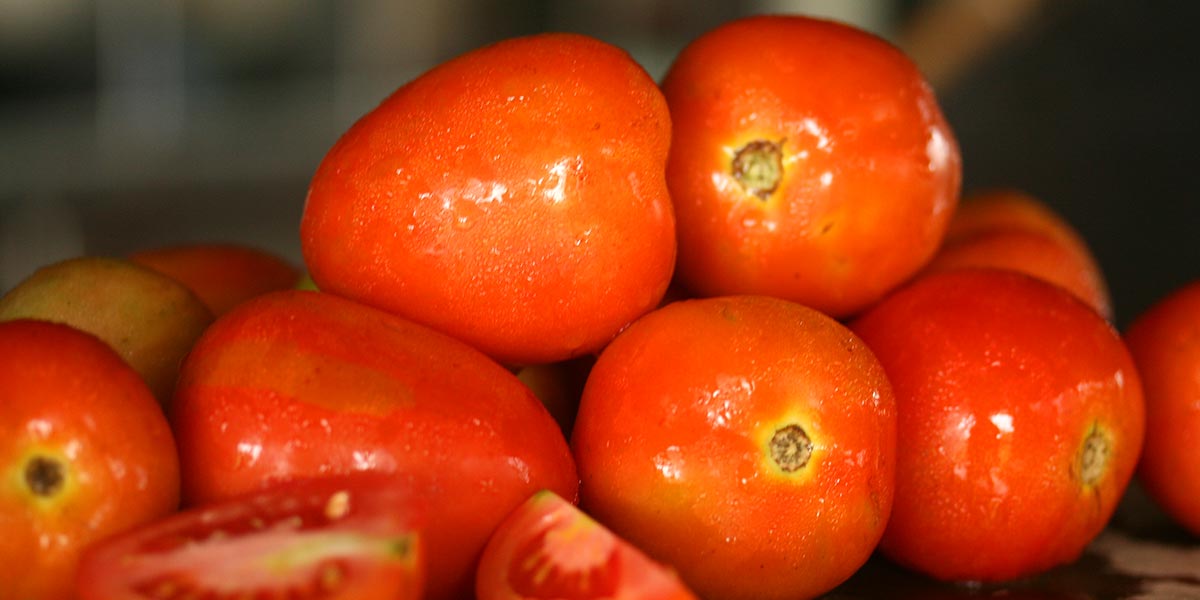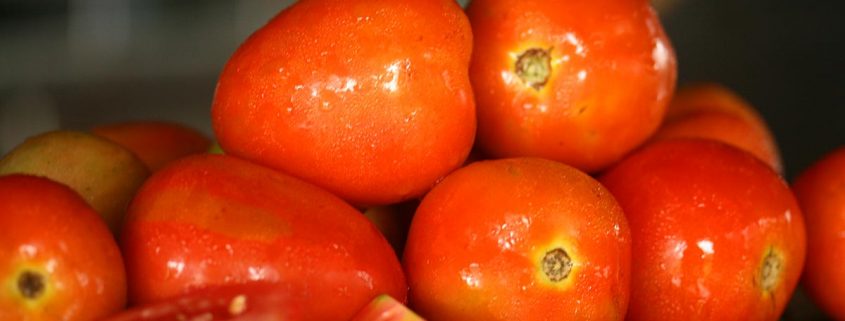Rotten Tomatos?
Before and beyond all the expert advice of nutritionists, chefs, magazines and school teachers who tell you what you should eat: Please eat local! And I mean really local. I mean so extremely local, that you question where your sandwich grains have been grown. Or at least who is the hero that woke up at 2 am to bake that bread.

I tell people I never watch movies. It’s as much true as the fact that I never eat junk food. It’s true to the extent that it happens very rarely and it usually disappoints me so much that I tend to forget about it soon after. And since I don’t remember it, it mustn’t have happened – ha! Last night my spirit was in need of some nurturing via carnivorous cuisine, leading this passionate vegetarian chef from the ashram grounds, in search of some fine fried chicken in the village. It goes under the name of JFC, Java Fried Chicken. The name in itself deserves a round of applause. These delicate, fatty, crunchy, large nuggets of nourishment retail for 5000 rupiah a pop and include a sachet of sweet and spicy sambal, a perfect condiment for the occasion. Not one but two of these delicious fry-ups came with me to my room where we spent some quality time together. In typical western style of multi-tasking, (which the Balinese would Never do), I ran my greasy hands over my laptop keyboard and mindlessly clicked on an icon saying ‘beyond borders’. It turned out to be a movie which a friend copied onto my laptop a while ago. It didn’t take long for me to be weeping big salty tears over all that’s wrong with the world, including the devastation of hunger in Africa was portrayed in this glorious flick. I should also admit that these tears of sorrow were quickly replaced by a strong yearning to lose myself in both eyes and lips of the main actress. I kept wondering who she was. A quick google search afterwards taught me this is indeed the rather well known Angelina Jolie. A website named ‘rotten tomatoes’ reviewed this movie with very poor ratings. The fact that I don’t know good movies nor famous actresses reaffirmed to me that it’s best to spend my nights relaxing in the local hot springs again. That option is a lot less emotionally stirring anyway.
Where is this going you may wonder? Hang in there.
Hunger and Rotten tomatoes: The next morning I decided to take our head gardener, Igung, on a little excursion. There are not many people I know who are attuned to the earth like he is. The day before I noticed that both the man himself and our vegetable gardens were a bit out of sorts. We decided it would be good to connect once more with the local farming community around the Bedugul highlands. We scooted along country roads, stopping at cabbage and carrot patches wedged among dramatic mountain backdrops. We smelled earth and squeezed leaves, and finally found ourselves chatting to a tomato farmer in the shade of a banana tree. Instantly struck by the look of what must have been a hectare of tomato plants, all absolutely loaded with bright red, sugar dripping aromatic vine tomatoes, we both stood stunned and smiling. Though prosperous and delicious it actually depicts a drama. There’s no way you can still sell tomatoes this ripe.
Igung asked the farmer why he didn’t harvest his crop. The farmer explained that after the holidays the market has been saturated and the price of tomatoes has now dropped to a meager 300 rupiah a kilo. That is, at time of writing, three cents! This means that the good man cannot possibly afford workers to harvest his tomatoes so he’s just letting them go to waste. These tomatoes had been grown with love and without the use of chemicals. They deserve better than this. I’m an emotional eater. When I feel heartbreak and confusion at intense news like the one above, it’s best for me to stay away from food. In this moment I quickly swallowed six tomatoes straight off the vine. I thought about building a tomato sauce factory. It sounded a bit too involved. I ate another four tomatoes and desperately looked at Igung. He looked sad; he doesn’t like the sight of food going to waste either. Who does really? I ate five more tomatoes whilst having visions of drying, pickling and canning vast amounts of these red rangers at Bali Silent Retreat. After a small strategy discussion with Igung I was reminded that transporting 200 kilos of tomatoes on two motorbikes is really no big issue for any Balinese person. With that in mind we decided to come back that afternoon and harvest the tomatoes ourselves. We assured the farmer we would pay him a fair price too.
There are huge debates on the causes and effects of hunger in the world. I’m certainly keeping my strong opinion to myself for now. What I do want to state is a fact: There are enough wealth and resources on our planet today to feed every single living being. Overall shortages are not the reason why thousands of people die of hunger and malnutrition every day.
Does that shock us ? It’s is very hard to make an impact on a western persons with some fact and figures on starvation and disease. We become numb, I guess.
Clearly it’s an issue of having too much food in one place and not enough in the other. But let me side step a hunger debate; there are plenty of experts out there who do a much better job at that. In fact I I’m just writing at this moment in time, to pledge one case. Before and beyond all the expert advice of nutritionists, chefs, magazines and school teachers who tell you what you should eat: Please eat local! And I mean really local. I mean so extremely local, that you question where your sandwich grains have been grown. Or at least who is the hero that woke up at 2 am to bake that bread. That means you can now skip most aisles in the supermarket. And you’re going to have to learn a recipe or two if you don’t already know. Perhaps you can figure out which foods are in season in the place you live.
What strikes me as significant?
The modern day heroes of the holistic health communities, the expert nutritionists and super food doctors of our modern age would all agree on this. Modern medicine’s pharmaceutical approach to disease – one pill for every ill – is flawed at its core.
Different people, same illness: different cure right? Yet those very food doctors now convince the entire world’s population to all eat quinoa. Disaster! Quinoa, the back bone of Peru has kept the natives strong and shining for centuries. It works for them so it must work for us. True, I’m sure. So now that we’re prepared to pay big US bucks for this grain of the gods the quinoa industry is booming in South America. Great you may think. But it’s not. It’s not Because now the locals cannot afford to buy quinoa themselves anymore and their health is now being put at risk. We’re polluting the planet to bring quinoa halfway around the world to a health food store near each of us. And if that isn’t bad enough – yikes, if humans get jet lagged from 20 hours in planes, Quinoa probably feels the same, with not much left to give after a long, bumpy, vacuum packed journey. There’s nothing selfish about wanting to nourish our bodies with the best food available, what price you do pay? Let’s adapt to our environment and choose our super foods from there. If you’re an Eskimo, reading this at an internet café in a north pole town, I suggest ordering seal blubber smoothies instead of spirulina from now on. If you’re on Bali, like most of us reading this, lucky you. This is super food central! Make sure to feature these heavily in your diet:
Coconuts in any shape or form, as long as it’s unrefined and pure. Use the oil in cooking and on your skin. Use the milk like you would use cows milk. Eat the young meat straight from the shell. Grate and cook the older, firmer meat. I digress. If you live here, you know all this stuff.
If you use sugar, local palm sugar and honey are two great options. No more funny cactus syrup from Mexican deserts. Unless you’re in Mexico.
Buy a big bag of red rice from a local farmer. It’s great for breakfast porridge. Oats don’t grow in Bali. Period.
There’s an abundance of ginger tucked away in the soil underneath your feet, go digging!
There are tons of fruit, get to know the seasons. Visit the farms, go pick wild stuff in the jungle.
Beware, always make sure it’s as local as possible. I’ve spotted papaya from Thailand in Balinese supermarkets, while I had spotted them hanging of trees on the side of the road that same day. This is still a crazy world. Yet it’s catering to our needs and ignorance. Let’s educate ourselves.
At Bali Silent Retreat, most of our food is produced locally- mostly in our own vegetable gardens -some from our farmer colleagues in the area. A small percentage of our ingredients come from other Indonesian islands and only a select few from overseas. Go check your cupboards. Where is your food coming from?
Thanks for caring.




